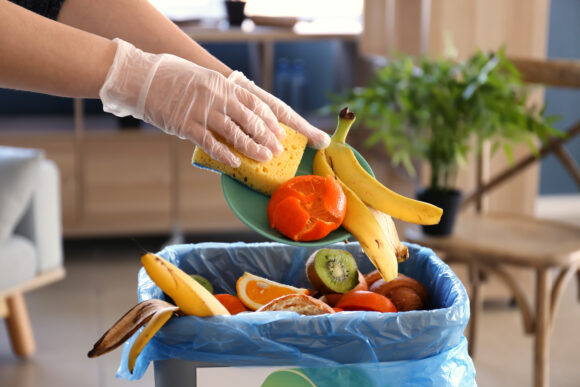
As the end of summer nears, gardeners and fresh vegetable enthusiasts await in anticipation for an abundance of Jersey Fresh produce. However, even the biggest veggie-lovers often end up with more than they can handle, whether you have an excess of garden tomatoes or a vegetable from your CSA box you don’t know how to use. Here are some tips for using all your fresh produce so nothing goes to waste.
Some Facts on Food Waste
First, let’s learn a bit more about food waste and why it is a problem. Currently, we throw away between 30-40% of the food that is produced in this country every year. This is problematic for the environment, since food waste is a major producer of greenhouse gases. Wasting food also wastes all the resources that went into growing that food and getting it to the consumer: land, water, energy, and labor. Food waste is also an expensive problem: we waste $218 billion of food annually, which breaks down to an average of about $2300 per year for a family of four. More about food waste and its environmental and economic impacts can be found in a Rutgers fact sheet.
Although this is a major global issue, each of us can do our part to reduce food waste. The ideas in this article will help you prevent food waste from your summer produce and can be used year-round for your supermarket purchases.
Home Food Preservation
Ensure that your produce lasts through the colder months by preserving it at home by canning, freezing, dehydrating, pickling, or creating a version of a food that will last, such as jam. All these methods require some know-how but are relatively easy to do once you learn the steps; plus, they result in delicious foods you can enjoy year-round. Rutgers Department of Family and Community Health Sciences (FCHS) can help you learn to preserve food safely and effectively. The webinar series RU Ready to Preserve Food at Home? is found here.
Try A New Recipe
In a recipe rut? Use your produce as inspiration to try something new and search for recipe ideas that feature the produce you have on hand. Consider making recipes that will allow vegetables to stay edible longer such as soups, chili, stews, or casseroles, which can be refrigerated or frozen to save for later. Got herbs? Use them to add flavor to a variety of dishes, Find nutritious, veggie-heavy recipes on Rutgers’ FCHS webpage, or on this NJDA Jersey Fresh webpage.
Keep it Simple
Sometimes the simplest approach is the best! Fresh veggies can be used to create delicious crudité platters – make one for yourself, to share at an event, or as a quick and easy side dish at dinnertime. Or get creative with salads: try adding fruit, seeds, nuts, and all your favorite veggies for a filling, nutritious meal or snack. Tired of all that produce? Fruit salads or platters are always a crowd-pleaser, even for the pickiest eaters. Slicing up fruit to make a fruit salad or platter allows you to cut off any bruises or bad spots without wasting the good parts.
Donating
Food pantries and soup kitchens consistently lack donations of fresh produce. Have you already given your friends and neighbors all the garden cucumbers they can handle? Summer in New Jersey may be the ideal time to use that bounty to help alleviate food insecurity close to home. Call your local food pantry or soup kitchen to ask if they accept donations of whatever produce you have. If you need help finding your closest one, the website AmpleHarvest.org allows you to search by location and matches you with a local organization that accepts donations of fresh produce.
Composting
Uneaten fruit and vegetables, scraps, peels, and cores can be used for composting. Composting is a natural process that allows microbes to break down certain materials into their mineral components. The finished product can be added to soil to improve growing conditions for plants in the garden or landscape. More information about home composting can be found in this Rutgers fact sheet.
Learn More
Rutgers FCHS department has a webinar, Reducing Food Waste at Home, that offers even more tips for using all your summer produce safely and effectively. The Department of Agriculture and Natural Resources has a recorded webinar on the Environmental Impacts of Food Waste that can be found here.
Keep it Jersey Fresh!
If you are looking for Jersey Fresh produce, you can find it at your local farm stand or farmer’s market. On the Jersey Fresh website, you can search by product and location to find your favorites close to home.
Written by Jennifer Shukaitis, educator, Department of Family and Community Health Sciences (FCHS) and Amy Rowe, agricultural agent, Rutgers Cooperative Extension of Essex and Passaic counties.

